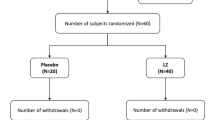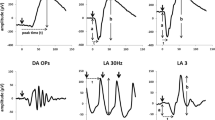Abstract.
The excessive enlargement of the eye seen in myopia is known to be regulated, in part, by retinal neurotransmitters. One excitatory retinal neurotransmitter, acetylcholine, has been implicated in the signal cascade through the effectiveness of the muscarinic antagonist, atropine, in preventing myopia development. The present study therefore examined whether an indirect cholinomimetic, diisopropylfluorophosphate (DFP), could increase the level of experimental myopia, induced by the deprivation of pattern vision. Injections of either phosphate-buffered DFP or phosphate-buffered saline were made every 48 h into the vitreous chamber of one eye of chicks. The injected eye was then deprived of pattern vision by a translucent occluder. The fellow eye remained untreated and acted as a genetic control. At the end of the treatment period (8 days) axial ocular dimensions and cycloplegic refractive error were measured. To investigate the effects of DFP on retinal neurotransmitter levels, measurements of acetylcholine and dopamine contents were made on retinal tissue following either a single or multiple DFP injections, using reverse phase high performance liquid chromatography (HPLC). Rather than potentiating myopia and vitreous chamber elongation, a significant reduction in myopia (58%) was observed in DFP-injected deprived eyes, compared to saline controls. However, open eyes injected with DFP showed no difference in refraction or vitreous chamber depth compared to contralateral control eyes or saline controls. HPLC analysis revealed increased steady-state content of acetylcholine (+34±6 ng/mg protein, mean ± SEM, P<0.01, equivalent to a 54% increase) and dopamine (+377±83 pg/mg protein, P<0.01, a 36% increase) in DFP-treated eyes compared to contralateral control eyes following a single DFP injection. No changes in either acetylcholine or dopamine content were found in saline-treated control animals. Injection of dopamine antagonists, in combination with DFP, indicated that the DFP-induced reduction in myopia is mediated, at least in part, through a D2 receptor mechanism. Findings argue against a direct cholinergic 'stop-go' pathway controlling ocular growth. Instead the reduction of induced myopia could be related to the action of DFP (directly or indirectly) on dopamine levels in the retina.
Similar content being viewed by others
Author information
Authors and Affiliations
Additional information
Electronic Publication
Rights and permissions
About this article
Cite this article
Cottriall, C.L., Brew, J., Vessey, K.A. et al. Diisopropylfluorophosphate alters retinal neurotransmitter levels and reduces experimentally-induced myopia. Naunyn-Schmied Arch Pharmacol 364, 372–382 (2001). https://doi.org/10.1007/s002100100460
Received:
Accepted:
Issue Date:
DOI: https://doi.org/10.1007/s002100100460




